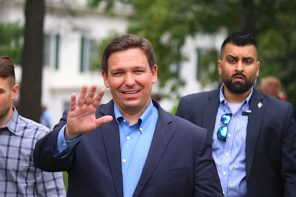Last week, Texas Republican Lamar Smith, chairman of the House Committee on Science, Space, and Technology, wrote an op-ed in the Wall Street Journal comparing climate change to religion. Smith argues that the “facts alone,” and not preordained ideological commitments, should inform U.S. climate policy. We need “open debate and critical thinking,” says Smith, which are fundamental to the scientific process and democratic deliberation. Smith couldn’t be more right, or more hypocritical.
Comparing climate change to religion has become a go-to GOP talking point during the run-up to next year’s elections. Painting climate science and proposed reforms as “articles of faith” allows Republicans to avoid criticism for their political inaction. It reduces a deeply consequential scientific consensus about global risk to the culture war rhetoric of cable news.
The strategy is not new. In a much-cited 2003 speech, science fiction superstar Michael Crichton took a break from dinosaur DNA to pontificate on environmentalism as “the religion of choice for urban atheists.” Emory professor Paul Rubin (also in the Wall Street Journal) and former Australian Prime Minister John Howard have both likened environmentalism to religion. More recently, so have writers for the American Thinker, Science 2.0, and the Milwaukee Journal Sentinel.
The basic premise of these comparisons is that extreme environmentalists exhibit some hallmark features of religion: rituals and taboos (such as recycling or avoiding meat); apocalyptic beliefs (global ruin due to climate change); and ideals rooted in an Edenic past (Earth before humans).
These metaphors are powerful. They influence our perception of the news by providing familiar cognitive templates for sorting out complex issues. Linguistics researchers Dimitrinka Atanasova and Nelya Koteyko recently documented how religious terms like “crusaders,” “conversion,” and “recant,” dominate media coverage of climate change, diverting focus from the scientific analyses at hand.
There are indeed some parallels between environmentalism and religion, but these reflect more basic universals of human psychology and society. Rituals, ethics, ideals, and essential thinking are to be found in almost any human collective, whether under the roof of a church, mosque, sports arena, or national political convention. Simple metaphors miss this nuance, sometimes strategically. The recent GOP strategy is to point out superficially religious elements of environmentalism and, by way of loose association, assign ideological bias to the incontrovertible scientific evidence of climate change.
Lamar Smith’s op-ed is a textbook example of this strategy. He cherry-picks examples of climate scientists using religious terms, citing former U.N. climate official Rajendra Pachauri, who has likened sustainability to his religion and dharma. Pachauri did so as part of a charged emotional incident—he was resigning as chair of the U.N.’s Intergovernmental Panel on Climate Change after a sexual harassment scandal—but even then, it’s not unusual to use religious terms to describe one’s commitment to a calling. Religious language is a common way to say that something is uniquely important to a person’s life. It doesn’t necessarily come with anti-scientific ideological baggage.
Smith’s most damning critique of Climate-Change Religion is that it ignores the facts, uncritically repeating disproven claims:
In its 2012 Special Report on Extreme Events, the U.N.’s Intergovernmental Panel on Climate Change says there is “high agreement” among leading experts that long-term trends in weather disasters are not attributable to human-caused climate change. Why do the president and others in his administration keep repeating this untrue claim?
According to Smith, science indicates that human activity does not influence weather disasters, yet the ideological of environmentalism ignores this fact. Out of curiosity, we went to the IPCC’s 2012 Special Report. We read, searched, and scanned, and could not find a single iota of support for Smith’s claims.
What we did find was the opposite. From the report’s summary Fact Sheet: “Natural climate variability and human-generated climate change influence the frequency, intensity, spatial extent, and duration of some extreme weather and climate events.” The report foresees further increases in extreme weather and climate events over the rest of the 21st century. Is Congressman Smith cherry picking data again? Or is he fabricating data whole cloth? Either way, Smith is engaged in the very anti-scientific thinking that he ostensibly derides.
“Tu quoque,” says the climate denier, “You, too, are motivated by ideology instead of the facts.” Meanwhile, the world is burning.




